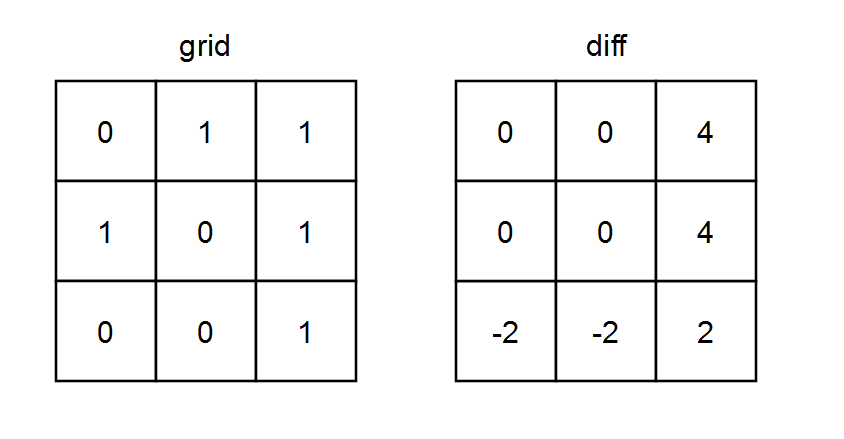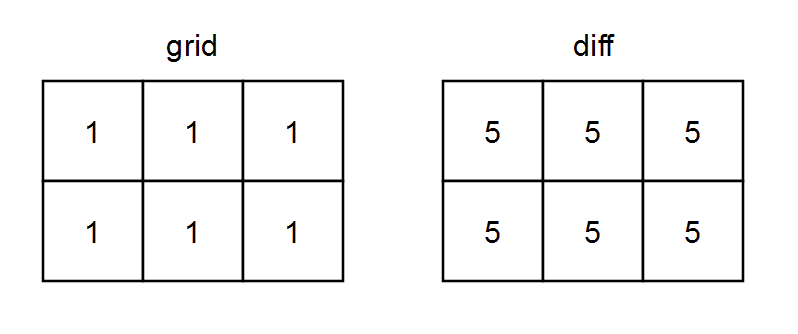| comments | difficulty | edit_url | rating | source | tags | |||
|---|---|---|---|---|---|---|---|---|
true |
中等 |
1372 |
第 92 场双周赛 Q2 |
|
给你一个下标从 0 开始的 m x n 二进制矩阵 grid 。
我们按照如下过程,定义一个下标从 0 开始的 m x n 差值矩阵 diff :
- 令第
i行一的数目为onesRowi。 - 令第
j列一的数目为onesColj。 - 令第
i行零的数目为zerosRowi。 - 令第
j列零的数目为zerosColj。 diff[i][j] = onesRowi + onesColj - zerosRowi - zerosColj
请你返回差值矩阵 diff 。
示例 1:
输入:grid = [[0,1,1],[1,0,1],[0,0,1]] 输出:[[0,0,4],[0,0,4],[-2,-2,2]] 解释: - diff[0][0] =onesRow0 + onesCol0 - zerosRow0 - zerosCol0= 2 + 1 - 1 - 2 = 0 - diff[0][1] =onesRow0 + onesCol1 - zerosRow0 - zerosCol1= 2 + 1 - 1 - 2 = 0 - diff[0][2] =onesRow0 + onesCol2 - zerosRow0 - zerosCol2= 2 + 3 - 1 - 0 = 4 - diff[1][0] =onesRow1 + onesCol0 - zerosRow1 - zerosCol0= 2 + 1 - 1 - 2 = 0 - diff[1][1] =onesRow1 + onesCol1 - zerosRow1 - zerosCol1= 2 + 1 - 1 - 2 = 0 - diff[1][2] =onesRow1 + onesCol2 - zerosRow1 - zerosCol2= 2 + 3 - 1 - 0 = 4 - diff[2][0] =onesRow2 + onesCol0 - zerosRow2 - zerosCol0= 1 + 1 - 2 - 2 = -2 - diff[2][1] =onesRow2 + onesCol1 - zerosRow2 - zerosCol1= 1 + 1 - 2 - 2 = -2 - diff[2][2] =onesRow2 + onesCol2 - zerosRow2 - zerosCol2= 1 + 3 - 2 - 0 = 2
示例 2:
输入:grid = [[1,1,1],[1,1,1]] 输出:[[5,5,5],[5,5,5]] 解释: - diff[0][0] = onesRow0 + onesCol0 - zerosRow0 - zerosCol0 = 3 + 2 - 0 - 0 = 5 - diff[0][1] = onesRow0 + onesCol1 - zerosRow0 - zerosCol1 = 3 + 2 - 0 - 0 = 5 - diff[0][2] = onesRow0 + onesCol2 - zerosRow0 - zerosCol2 = 3 + 2 - 0 - 0 = 5 - diff[1][0] = onesRow1 + onesCol0 - zerosRow1 - zerosCol0 = 3 + 2 - 0 - 0 = 5 - diff[1][1] = onesRow1 + onesCol1 - zerosRow1 - zerosCol1 = 3 + 2 - 0 - 0 = 5 - diff[1][2] = onesRow1 + onesCol2 - zerosRow1 - zerosCol2 = 3 + 2 - 0 - 0 = 5
提示:
m == grid.lengthn == grid[i].length1 <= m, n <= 1051 <= m * n <= 105grid[i][j]要么是0,要么是1。
根据题意模拟即可。
时间复杂度
class Solution:
def onesMinusZeros(self, grid: List[List[int]]) -> List[List[int]]:
m, n = len(grid), len(grid[0])
rows = [0] * m
cols = [0] * n
for i, row in enumerate(grid):
for j, v in enumerate(row):
rows[i] += v
cols[j] += v
diff = [[0] * n for _ in range(m)]
for i, r in enumerate(rows):
for j, c in enumerate(cols):
diff[i][j] = r + c - (n - r) - (m - c)
return diffclass Solution {
public int[][] onesMinusZeros(int[][] grid) {
int m = grid.length, n = grid[0].length;
int[] rows = new int[m];
int[] cols = new int[n];
for (int i = 0; i < m; ++i) {
for (int j = 0; j < n; ++j) {
int v = grid[i][j];
rows[i] += v;
cols[j] += v;
}
}
int[][] diff = new int[m][n];
for (int i = 0; i < m; ++i) {
for (int j = 0; j < n; ++j) {
diff[i][j] = rows[i] + cols[j] - (n - rows[i]) - (m - cols[j]);
}
}
return diff;
}
}class Solution {
public:
vector<vector<int>> onesMinusZeros(vector<vector<int>>& grid) {
int m = grid.size(), n = grid[0].size();
vector<int> rows(m);
vector<int> cols(n);
for (int i = 0; i < m; ++i) {
for (int j = 0; j < n; ++j) {
int v = grid[i][j];
rows[i] += v;
cols[j] += v;
}
}
vector<vector<int>> diff(m, vector<int>(n));
for (int i = 0; i < m; ++i) {
for (int j = 0; j < n; ++j) {
diff[i][j] = rows[i] + cols[j] - (n - rows[i]) - (m - cols[j]);
}
}
return diff;
}
};func onesMinusZeros(grid [][]int) [][]int {
m, n := len(grid), len(grid[0])
rows := make([]int, m)
cols := make([]int, n)
diff := make([][]int, m)
for i, row := range grid {
diff[i] = make([]int, n)
for j, v := range row {
rows[i] += v
cols[j] += v
}
}
for i, r := range rows {
for j, c := range cols {
diff[i][j] = r + c - (n - r) - (m - c)
}
}
return diff
}function onesMinusZeros(grid: number[][]): number[][] {
const m = grid.length;
const n = grid[0].length;
const rows = new Array(m).fill(0);
const cols = new Array(n).fill(0);
for (let i = 0; i < m; i++) {
for (let j = 0; j < n; j++) {
if (grid[i][j]) {
rows[i]++;
cols[j]++;
}
}
}
const ans = Array.from({ length: m }, () => new Array(n).fill(0));
for (let i = 0; i < m; i++) {
for (let j = 0; j < n; j++) {
ans[i][j] = rows[i] + cols[j] - (m - rows[i]) - (n - cols[j]);
}
}
return ans;
}impl Solution {
pub fn ones_minus_zeros(grid: Vec<Vec<i32>>) -> Vec<Vec<i32>> {
let m = grid.len();
let n = grid[0].len();
let mut rows = vec![0; m];
let mut cols = vec![0; n];
for i in 0..m {
for j in 0..n {
if grid[i][j] == 1 {
rows[i] += 1;
cols[j] += 1;
}
}
}
let mut ans = vec![vec![0; n]; m];
for i in 0..m {
for j in 0..n {
ans[i][j] = (rows[i] + cols[j] - (m - rows[i]) - (n - cols[j])) as i32;
}
}
ans
}
}/**
* Return an array of arrays of size *returnSize.
* The sizes of the arrays are returned as *returnColumnSizes array.
* Note: Both returned array and *columnSizes array must be malloced, assume caller calls free().
*/
int** onesMinusZeros(int** grid, int gridSize, int* gridColSize, int* returnSize, int** returnColumnSizes) {
int* rows = malloc(sizeof(int) * gridSize);
int* cols = malloc(sizeof(int) * gridColSize[0]);
memset(rows, 0, sizeof(int) * gridSize);
memset(cols, 0, sizeof(int) * gridColSize[0]);
for (int i = 0; i < gridSize; i++) {
for (int j = 0; j < gridColSize[0]; j++) {
if (grid[i][j]) {
rows[i]++;
cols[j]++;
}
}
}
int** ans = malloc(sizeof(int*) * gridSize);
for (int i = 0; i < gridSize; i++) {
ans[i] = malloc(sizeof(int) * gridColSize[0]);
for (int j = 0; j < gridColSize[0]; j++) {
ans[i][j] = rows[i] + cols[j] - (gridSize - rows[i]) - (gridColSize[0] - cols[j]);
}
}
*returnSize = gridSize;
*returnColumnSizes = gridColSize;
return ans;
}
